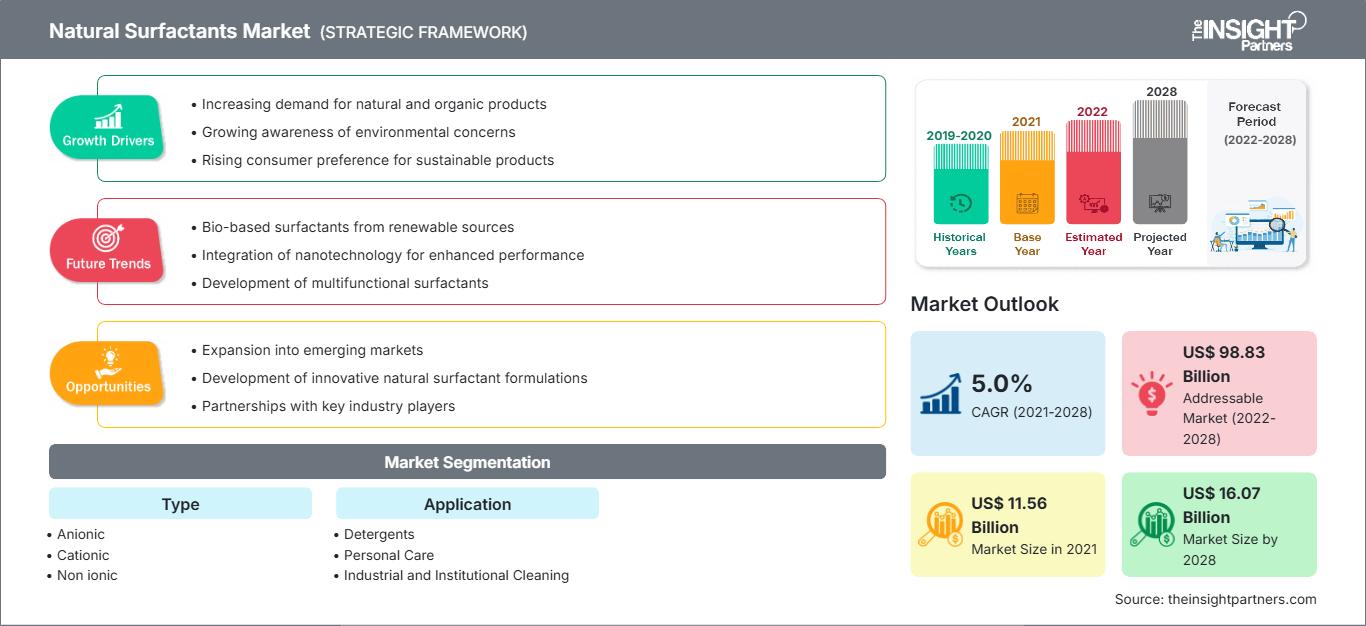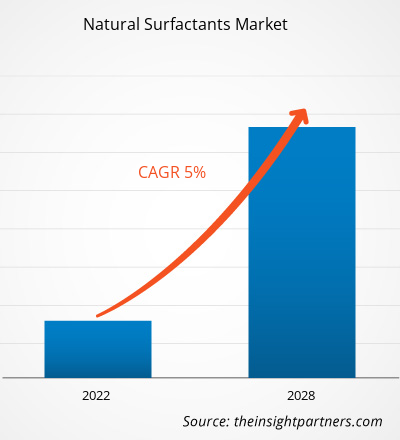[Forschungsbericht]Der Markt für natürliche Tenside soll von 11.558,34 Millionen US-Dollar im Jahr 2021 auf 16.069,28 Millionen US-Dollar im Jahr 2028 wachsen; von 2022 bis 2028 wird mit einer durchschnittlichen jährlichen Wachstumsrate von 5,0 % gerechnet.
Natürliche Tenside werden aus verschiedenen Pflanzenarten gewonnen. Gängige Quellen sind Kokosnuss oder Palme, aber auch andere Gemüse- und Obstsorten können natürliche Tenside enthalten. Darüber hinaus können natürliche Tenside auch aus Industrieabfällen und Nebenprodukten hergestellt werden. Aufgrund ihres biologischen Ursprungs sind natürliche Tenside leichter biologisch abbaubar als ihre synthetischen Gegenstücke.
Im Jahr 2021 hatte der asiatisch-pazifische Raum den größten Umsatzanteil am globalen Markt für natürliche Tenside. Wichtige Faktoren, die den Markt für natürliche Tenside im asiatisch-pazifischen Raum antreiben, sind das zunehmende Bewusstsein für ihre Vorteile und ihre zunehmende Verwendung in verschiedenen Anwendungen wie Waschmitteln, Kosmetika und Körperpflege, Industriereinigung und Landwirtschaft. Chemisch synthetisierte Tenside auf Erdölbasis sind in der Regel nicht biologisch abbaubar und umweltschädlich. Die Produktionsprozesse synthetischer Tenside und ihrer Nebenprodukte können umweltschädlich sein. Infolgedessen wächst das Bewusstsein für die Notwendigkeit des Umweltschutzes. Daher nimmt die Verwendung natürlicher Tenside in der Region zu, was das Marktwachstum für natürliche Tenside im asiatisch-pazifischen Raum vorantreibt.
Passen Sie diesen Bericht Ihren Anforderungen an
Sie erhalten kostenlos Anpassungen an jedem Bericht, einschließlich Teilen dieses Berichts oder einer Analyse auf Länderebene, eines Excel-Datenpakets sowie tolle Angebote und Rabatte für Start-ups und Universitäten.
Markt für natürliche Tenside: Strategische Einblicke

-
Holen Sie sich die wichtigsten Markttrends aus diesem Bericht.Dieses KOSTENLOSE Beispiel umfasst Datenanalysen, die von Markttrends bis hin zu Schätzungen und Prognosen reichen.
Auswirkungen der COVID-19-Pandemie auf den Markt für natürliche Tenside
Vor der COVID-19-Pandemie wurde der Markt für natürliche Tenside hauptsächlich durch deren zunehmende Verwendung in verschiedenen Branchen wie Körperpflege, Reinigungsmitteln, industrieller und institutioneller Reinigung, Ölfeldchemikalien, Agrarchemikalien und anderen vorangetrieben. Im Jahr 2020 mussten jedoch verschiedene Branchen ihre Produktion aufgrund von Störungen der Wertschöpfungsketten infolge der Schließung nationaler und internationaler Grenzen drosseln. Die COVID-19-Pandemie verursachte Lieferkettenunterbrechungen bei wichtigen Rohstoffen und behinderte Herstellungsprozesse aufgrund von Beschränkungen, die von Regierungsbehörden in zahlreichen Ländern verhängt wurden. Die Nachfrage nach natürlichen Tensiden aus verschiedenen Branchen ging aufgrund der Schließung der Industrien zurück.
Die Nachfrage nach Körperpflege- und Haushaltspflegeprodukten stieg aufgrund der COVID-19-Pandemie, was sich positiv auf die Produktion natürlicher Tenside für Haushalte und andere Anwendungen auswirkte. Darüber hinaus spielen natürliche Tenside eine Schlüsselrolle bei der Bekämpfung der Pandemie. Gängige natürliche Tenside werden in Seifen und anderen Körperreinigungsprodukten, Waschmitteln und Reinigern für feste Oberflächen verwendet, um SARS-CoV-2 zu deaktivieren und von der Haut und anderen Oberflächen zu entfernen.
Markteinblicke
Steigende Nachfrage nach Waschmitteln im Haushalt
Mit der zunehmenden Verbreitung von Infektionskrankheiten, insbesondere COVID-19, wird den Menschen Sauberkeit und Hygiene immer wichtiger. Die Bedeutung von Handdesinfektion, Hygiene und Sauberkeit hat aufgrund der sich schnell ausbreitenden Infektionskrankheiten wie Norovirus und Grippe zugenommen. Der Bedarf an Waschmitteln im Haushalt wächst aufgrund der zunehmenden Verwendung von Waschmitteln und Haushaltsreinigern.
Waschmittel werden häufig zum Reinigen verwendet, da sie Wasser und Öl verbinden und so wirksam gegen ölige Flecken und Fett sind. Angehörige der Gesundheitsberufe führen in mehreren Entwicklungsländern Aufklärungskampagnen zum Thema Hygiene durch, um die Aufmerksamkeit der Verbraucher zu erregen und das Bewusstsein zu schärfen. Infolgedessen Die Nachfrage nach Körperpflege- und Haushaltsreinigungsprodukten steigt.
Typeneinblicke
Basierend auf dem Typ ist der globale Markt für natürliche Tenside in anionische, kationische, nichtionische und amphotere Tenside unterteilt. Das anionische Segment hatte 2021 den größten Marktanteil an natürlichen Tensiden. Anionische Tenside zeichnen sich durch eine negativ geladene hydrophile polare Gruppe aus. Aufgrund ihrer besten Reinigungskraft und der großen Schaumbildung sind sie die am häufigsten verwendeten Tenside. Diese Tenside reinigen am besten, da sie durch Ladungsabstoßung reinigen. Anionische Tenside eignen sich hervorragend zum Entfernen von Schmutz, Ton und einigen öligen Flecken. Diese anionischen Tenside sind in Shampoos, Duschgels, Zahnpasta usw. enthalten. Glutamat, Kaliumcocoat, Isethionat und Natriumcocosulfat sind einige Beispiele für natürliche anionische Tenside.
Zu den Akteuren auf dem globalen Markt für natürliche Tenside gehören BASF SE, Clariant AG, Croda International Plc, Dow Inc., KAO Corporation, Lankem Ltd., Solvay SA, Arkema, Stepan Company und Evonik Industries AG. Die Akteure auf dem Markt für natürliche Tenside konzentrieren sich auf die Bereitstellung qualitativ hochwertiger Produkte, um die Kundennachfrage zu erfüllen. Sie konzentrieren sich auch auf Strategien wie Investitionen in Forschungs- und Entwicklungsaktivitäten und die Einführung neuer Produkte.
Berichts-Spotlights
- Fortschreitende Branchentrends auf dem Markt für natürliche Tenside, um den Akteuren bei der Entwicklung effektiver langfristiger Strategien zu helfen
- Geschäftswachstumsstrategien in entwickelten und sich entwickelnden Märkten
- Quantitative Analyse des Marktes für natürliche Tenside von 2020 bis 2028
- Schätzung der weltweiten Nachfrage nach natürlichen Tensiden
- Porters Fünf-Kräfte-Analyse zur Veranschaulichung der Wirksamkeit von Käufern und Lieferanten in der Branche
- Jüngste Entwicklungen zum Verständnis des wettbewerbsorientierten Marktszenarios
- Markttrends und -aussichten sowie Faktoren, die das Wachstum des Marktes für natürliche Tenside vorantreiben und hemmen
- Unterstützung im Entscheidungsprozess durch Hervorhebung von Marktstrategien, die das kommerzielle Interesse untermauern und zum Wachstum des Marktes für natürliche Tenside führen
- Die Größe des Marktes für natürliche Tenside an verschiedenen Knotenpunkten
- Detaillierte Übersicht und Segmentierung des Markt sowie die Dynamik der Branche für natürliche Tenside
- Größe des Marktes für natürliche Tenside in verschiedenen Regionen mit vielversprechenden Wachstumschancen
Markt für natürliche Tenside
Die Analysten von The Insight Partners haben die regionalen Trends und Faktoren, die den Markt für natürliche Tenside im Prognosezeitraum beeinflussen, ausführlich erläutert. In diesem Abschnitt werden auch die Marktsegmente und die geografische Lage natürlicher Tenside in Nordamerika, Europa, im asiatisch-pazifischen Raum, im Nahen Osten und Afrika sowie in Süd- und Mittelamerika erörtert.Umfang des Marktberichts über natürliche Tenside
| Berichtsattribut | Einzelheiten |
|---|---|
| Marktgröße in 2021 | US$ 11.56 Billion |
| Marktgröße nach 2028 | US$ 16.07 Billion |
| Globale CAGR (2021 - 2028) | 5.0% |
| Historische Daten | 2019-2020 |
| Prognosezeitraum | 2022-2028 |
| Abgedeckte Segmente |
By Typ
|
| Abgedeckte Regionen und Länder |
Nordamerika
|
| Marktführer und wichtige Unternehmensprofile |
|
Dichte der Marktteilnehmer für natürliche Tenside: Verständnis ihrer Auswirkungen auf die Geschäftsdynamik
Der Markt für natürliche Tenside wächst rasant. Die steigende Nachfrage der Endverbraucher ist auf Faktoren wie veränderte Verbraucherpräferenzen, technologische Fortschritte und ein stärkeres Bewusstsein für die Produktvorteile zurückzuführen. Mit der steigenden Nachfrage erweitern Unternehmen ihr Angebot, entwickeln Innovationen, um den Bedürfnissen der Verbraucher gerecht zu werden, und nutzen neue Trends, was das Marktwachstum weiter ankurbelt.

- Holen Sie sich die Markt für natürliche Tenside Übersicht der wichtigsten Akteure
Globaler Markt für natürliche Tenside
Nach Typ
- Anionisch
- Glutamat
- Kaliumcocoat
- Isethionat
- Sonstige
- Kationisch
- Brassicylisoleucinate-Esylat
- Dialkylester-Ammoniummethosulfat
- Esterquat-Benzalkoniumchlorid
- Polyquaternium
- CTAC (Cetrimoniumchlorid)
- BTAC (Behentrimoniumchlorid)
- Sonstige
- Nicht ionisch
- Saponine
- Glucoside
- Glyceride
- Ethoxylate
- Cocamid MEA (CMEA)
- Cocamid DEA (CDEA)
- Sonstige
- Amphoter
- Betaine
- Amphoacetate
- Sultaine
- Aminoxide und Sonstige
Nach Anwendung
- Reinigungsmittel
- Körperpflege
- Industrielle und institutionelle Reinigung
- Ölfeldchemikalien
- Agrarchemikalien
- Sonstige
Unternehmensprofile
- BASF SE
- Clariant AG
- Croda International Plc
- Dow Inc.
- KAO Corporation
- Lankem Ltd.
- Solvay SA
- Arkema
- Stepan Company
- Evonik Industries AG
- Historische Analyse (2 Jahre), Basisjahr, Prognose (7 Jahre) mit CAGR
- PEST- und SWOT-Analyse
- Marktgröße Wert/Volumen – Global, Regional, Land
- Branchen- und Wettbewerbslandschaft
- Excel-Datensatz
Aktuelle Berichte
Erfahrungsberichte
Grund zum Kauf
- Fundierte Entscheidungsfindung
- Marktdynamik verstehen
- Wettbewerbsanalyse
- Kundeneinblicke
- Marktprognosen
- Risikominimierung
- Strategische Planung
- Investitionsbegründung
- Identifizierung neuer Märkte
- Verbesserung von Marketingstrategien
- Steigerung der Betriebseffizienz
- Anpassung an regulatorische Trends






















 Kostenlose Probe anfordern für - Markt für natürliche Tenside
Kostenlose Probe anfordern für - Markt für natürliche Tenside